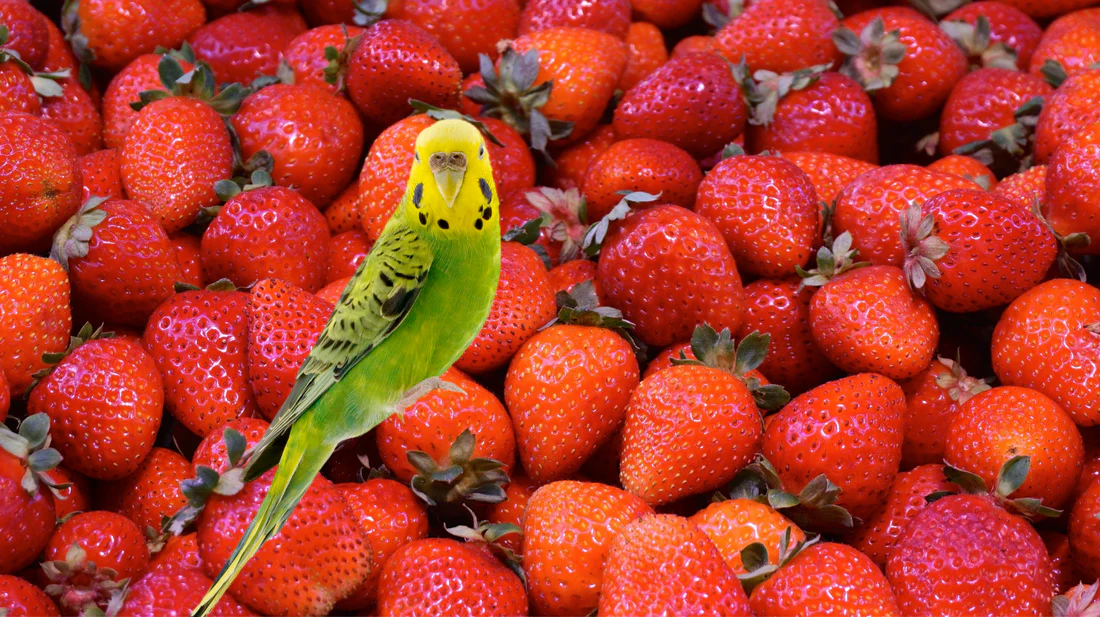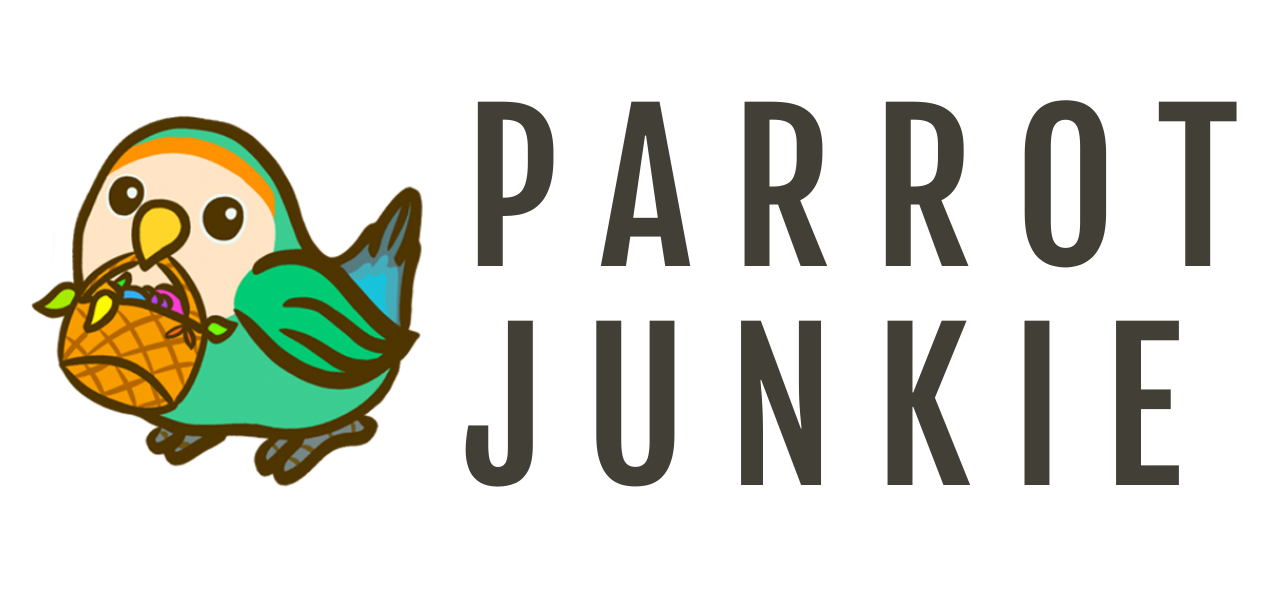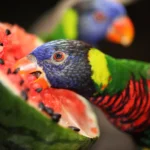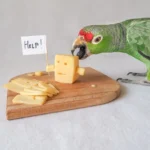
Can Parrots Eat Strawberries (Including Seeds, Flowers, And Leaves) – Safe or Toxic?
Strawberries are often the favorite fruit of humans, and they are very attractive as they are red and juicy-looking. We all know that strawberries are beneficial in human beings due to various vitamins and nutrients that it contains, which are good for our health. Likewise, these nutrients can also benefit a parrot.
THE VERDICT: Can parrots eat strawberries? YES, parrots can eat strawberries IN MODERATION, including its seeds, flowers, and leaves. Read why below!
Jump To Section
Are Strawberries Even Fruits?
Unlike its name, strawberries are not berries at all! In fact, they are not even considered true fruits. Botanists classify them under a group called “pseudocarp”, which means false fruit. Regardless, we still call strawberries a fruit in our daily usage.

What is actually the fruit are what we usually call the seeds. The little specks of seed-like things that are embedded on the exterior part of a strawberry are the true fruits of the plant. Hence, the part that we eat is consider a “multiple fruit” as there are many tiny fruits held together on the fleshy, red part of the plant.
Confused yet? The good news is, the above information is just for your general knowledge, and it is not wrong to call a strawberry a fruit, since this is common practice. So, let’s move on!
Are Strawberries Safe for Parrots?
Strawberries are safe for your parrots to snack on, especially the organic ones. Not unless your parrot happens to be allergic to strawberries (which I haven’t heard of so far). You don’t need to worry about any toxins from the plant itself when feeding them to your birds. That being said, you would still need to wash the strawberries well before feeding your parrots because they often contain pesticides.
However, you can’t remove the skin of a strawberry the way you do to other fruits. You cannot scrub it either to get rid of debris, as the fruit will be damaged. Therefore, it’s recommended that you soak the strawberries in a solution of baking soda and cold water for around 20 minutes to loosen pesticides. Baking soda is good for removing oily residues, and pesticides are usually made of oily components.
Alternatively, you can wash them with a safe detergent meant for fruits and vegetables, that is totally safe to eat. Such detergents often rinse away cleanly and do not stay as residues on the fruit if you rinse thoroughly.
Are Strawberries Good for Parrots?
Strawberries are great for parrots because they provide additional nutrients for the parrots. They are an excellent source of vitamins, minerals, fiber, and antioxidants.
Vitamins
Strawberries are packed with vitamin C, vitamin B9 (folate), and vitamin K that can help your parrot stay healthy and in shape.
Vitamin C boosts the immune system such that the parrot is able to fight off diseases and keep off from any form of illnesses. Vitamin C also keeps the skin healthy.
Vitamin B9 promotes growth of tissues and cell functioning in the body. It’s often associated with the normal functioning of the:
- Red blood cells
- RNA
- White blood cells
- DNA
- Cell division
Vitamin K plays a key role in blood clotting and building of bones. It enables wounds to heal faster and in an appropriate way.
Minerals
Strawberries contain a number of minerals including potassium and manganese. Manganese is necessary for metabolic actions in the body such as:
- Blood sugar regulation
- Absorption of calcium
- Carbohydrate metabolism
- Normal function of the brain and nerves
Potassium helps in regulation of nerve signals, muscle contractions, and fluid balance in a parrot’s body. It plays a major role in regulation of pressure. It ensures that the blood pressure does not go beyond the normal range.
Fiber
Strawberries are rich in fiber. Fiber helps in:
- Bowel movement
- Preventing constipation
- Improving digestion of food
Bacteria in the gut also digests fiber, resulting in small chain fatty acids which are also essential to a bird’s health.
Antioxidants
Strawberries contain a high level of antioxidants known as polyphenols, which are necessary for boosting immune and skin health. The antioxidants play a role in protecting cells against heart, cancer, and many other diseases.
Parts And Types Of A Strawberry Plant
Leaves
Can parrots eat strawberry leaves? The answer is yes.
Parrots love trying new food items just like we always do. They won’t mind giving the strawberry leaves a bite to ascertain whether they are edible or not. It’s safe to feed your parrot strawberry leaves though not all of them like the taste of the leaves.
Some parrots eat both strawberry leaves and fruit. So, it’s important to wash the leaves thoroughly before offering it to your parrot because it may contain harmful substances such as pesticides. If the strawberry is home-grown and you are sure you have not used chemicals on them, it would be safe to feed after some rinsing.
Seeds
Parrots enjoy picking off the strawberry “seeds” that are located on the outer covering of the fruit. In fact, this is how parrots learn to be curious and try out strawberries. As many parrots love picking at seeds, they would try to pick out the strawberry seeds first and inevitably get a taste of the flesh too. The seeds are fully packed with fiber and other nutrients that are beneficial to the parrots and can definitely be fed to your parrot.
Flowers
Parrots can eat a variety of flowers, and strawberry flowers are one of them. Strawberry plants are generally safe for parrots, and the flowers are no exception. Therefore, yes, parrots can eat strawberry flowers.
One of the concerns, of course, is whether it contains a large amount of pesticides or not. If you are feeding home-grown strawberry plants or have purchased them organic, then it would be safe to feed after some washing. The other concern, I would imagine, is that the white flowers of the strawberry plant are precursors of the fruit itself, so, not every gardener would want to offer that to their birds, and would rather let them grow into fruits instead!
Green Strawberries (Unripe)
If you’ve ever had a chance to eat underripe strawberries that are still pale green in color, you would find that they are hard in texture and rather tangy. Generally, green strawberries can be fed to parrots, but whether the parrots would like them or not is another matter, as they don’t often taste very good. It would also be good to be cautious of the acidity level of green strawberries as there is no information whether this might upset the gut flora of the birds, if eaten in too high quantities.
Therefore, yes, parrots can eat green strawberries that are not yet fully ripe, but don’t give them too much of it!
Wild Strawberries

Wild strawberries are adorable, tiny little fruits that pack a punch, almost as if an entire strawberry fruit has been concentrated and compressed into this tiny fruit! In that sense, wild strawberries are similar to the larger strawberries we usually see in grocery stores. Therefore, yes, they are safe to feed to your parrots (after washing properly, of course).
Can Parrots Eat Mock Strawberries?

There is a type of plant called Indian strawberry, mock strawberry, or false strawberry, which is a small fruit that resembles a wild strawberry at first glance. Like the name suggests, these aren’t real strawberries!
While they are rather potent plants of which the leaves are used in herbal mixtures, the fruit itself is bland and does not taste as strong or juicy as a real wild strawberry. However, it is safe for human consumption in moderate amounts, and there is no reason to think that it would be toxic for parrots (judging by its nutritional contents).
However, as it is a medicinal herb, it should not be given in excess as we’d never know how it might affect a parrot’s health.
How About Strawberry Juice?
Parrots cannot resist strawberry juice. You should try giving them the juice. You can blend the strawberry fruit to obtain the juice. Avoid buying the already processed strawberry juice from the stores because they contain added corn syrup and sugars, which may affect your parrot’s health.
Do Parrots Like Strawberry?
I have found that parrots often enjoy eating strawberries. Even though they are picky eaters, you may still find them choosing strawberries over other fruits for the following reasons:
- Strawberries are very sweet. That’s why parrots always find it hard to resist the fruit.
- Strawberries come in a bright red color that attract parrots.
- They are juicy and have a seed-heavy texture on the exterior, which parrots can easily consume and even play with it while tearing down the layers.
That being said, some parrots are interestingly known to be afraid of bright red colors, and owners have shared that their parrots are actually afraid of red fruits! If you find that your parrot is afraid of strawberries, read the next section to find out how to introduce it to them.
How to Feed Parrots Strawberries?
First, ensure that the cage is clean and free from any debris and food remains from the previous feeding. The fruit should also be raw and fresh. Organic strawberries are the best because they are free from pesticides, and therefore safer to feed.
Wash the fruits thoroughly to get rid of the chemicals. Chop them into smaller pieces that your parrot can easily pick. This prevents them from messing everything up, or dropping them on the ground.
Parrots can easily grab the smaller pieces using their feet, meaning they’ll have more control over the pieces. Smaller pieces also allow you to comfortably hand-feed the parrot, which enhances your bonding process.
Clean the strawberry remains after the parrot is done eating. Parrots tend to tear the strawberries all over the floor of the cage. While this could be messy, parrots may be tempted to eat the remains later when they are already contaminated with bacteria.
If your parrot is afraid of the strawberry, try introducing it in smaller pieces that makes it look much less menacing to them. Some parrots (like my Indian ringneck parakeet, Freya) may be afraid of something initially, but start to get curious when they see their owners eating them. Show your parrot that you are enjoying eating a strawberry, and it might want a piece of it too!
Final Notes
Strawberries are a great fruit addition to a parrot’s balanced diet. The entire strawberry plant is safe for parrots, including leaves, seeds, fruit (ripe and underripe), and flowers. They are an excellent source of nutrients and antioxidants that keeps parrots healthy. Do not give your parrots too much strawberry, but mix it with other fresh fruits and vegetables for a well-balanced meal.
Feed them strawberries whole, or chopped up in small chunks. Parrots often love picking out the seeds and inevitably eat the flesh as well.
Parrot Junkie www.parrotjunkie.com
Copyright © 2021-2024. All rights reserved.



R. Rendleman
17 August 2024
My Caique is a strawberry ‘junkie’!